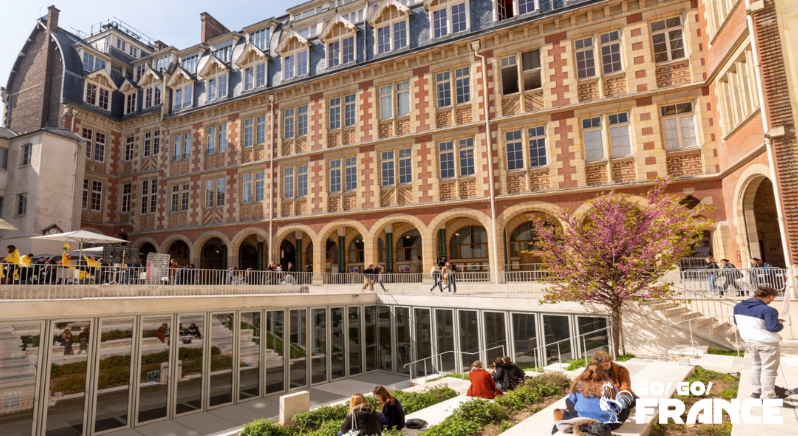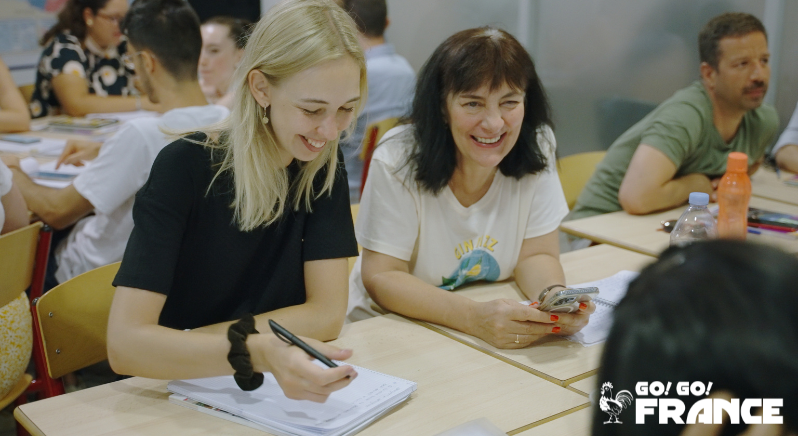Planning to learn French in France? Not sure whether to choose a language school or a university?
In this guide, we compare both options to help you understand their key similarities and differences, so you can choose the one that best fits your goals.
This comparison is based on two of our trusted partner institutions: the Alliance Française in Marseille (language school) and the Institut de Langue et de Culture Françaises (ILCF) in Paris (university).

Similarities between language schools and universities
Class size
You’ll enjoy small classes in both settings. Classes typically range from 12 to 18 students, allowing teachers to give personalized attention to each student. This also creates a friendly atmosphere that encourages speaking practice and interaction between classmates.
Teaching method
Teaching methods are similar and follow CEFR (Common European Framework of Reference for Languages) recommendations. Both use action-oriented, real-world approaches to help students gain confidence in speaking and understanding French.
Courses are available for all levels—from A1 (beginner) to C1 (advanced).
Course intensity
Most language schools and universities offer both standard and intensive courses. A standard course typically includes about 15 hours of French per week, while an intensive program offers around 20 hours per week.
Accreditation
Whether you choose to study at a language school or a university, we only work with institutions that hold the FLE accreditation (Français Langue Étrangère) and offer visa-compatible programs for international students.
Each school is carefully selected by our team based on teaching quality, course variety, and overall student experience. We personally visit and evaluate our partners to ensure it meets our high standards.

Differences between language schools and universities
Admission requirements
While both language schools and universities accept students of all ages and nationalities, universities require a high school diploma, whereas language schools do not.
Facilities
Language schools often offer a family-like environment at a human scale, while universities are larger institutions with multiple campuses and departments, mixing students from various fields of study.
Course length
Language schools offer short- and long-term programs. You can apply for as little as 1 week, up to 1 year or more. It’s easy to extend your program by adding more weeks as you go. This flexibility is especially helpful for students who wish to study for a few weeks or months without applying for a visa, as many nationalities can stay in France for up to 90 days without a visa.
Universities, on the other hand, offer fewer options. Most programs last 6 months or 1 year, and for these durations, a student visa is required (unless you’re an EU/EEA national).
Available start dates and spots
Language schools welcome new students every Monday throughout the year—except for complete beginners, who usually must start on specific dates. Most schools offer four beginner terms per year, allowing them to accommodate an unlimited number of students.
In contrast, universities follow the academic calendar, with courses typically starting in September. Spots may be limited to prevent overcrowded cohorts.
Tuition fees
Tuition fees at public universities are lower because higher education in France is subsidized by the government. As a result, the cost of learning French at a university is often more affordable than at a private language school.
However, prices at language schools can vary significantly depending on the city and school. The difference may not be significant enough to base your entire decision on price alone.
For example, at the Alliance Française, you would pay:
6 months: €4,320
1 year: €8,640
while at the Institut de Langue et de Culture Françaises, you would pay:
6 months: €3,990
1 year: €6,560
*Prices listed above are based on the 2025 public rates from each school and are provided for reference purposes only. Actual tuition may vary.
Language certifications and diplomas
Upon completion of their course, language school students receive an attendance certificate.
Our partner schools are also official exam centers for DELF, DALF, or TCF, which are internationally recognized language certifications issued by the French Ministry of Education. Many language school students prepare and pass the exam in France at their chosen school.
University students receive a University Diploma in French Studies (DUEF) which is a university degree that can only be awarded by a recognized French university.
Comparison table
| Language School | University | |
|---|---|---|
| Age requirement | 18+ | Same |
| Educational requirement | None | High school diploma |
| Visa requirement | Based on nationality and course length | Student visa required for non-EU students |
| Course length | From 1 week up to 1 year+ | 6 months or 1 year |
| Course intensity | Standard to intensive | Same |
| Start dates | Every Monday, all year round Fixed dates for complete beginners | Fixed dates 1 or 2 sessions per year |
| Tuition | Alliance Française – Marseille 6 months: €4,320 1 year: €8,640 | ILCF – Paris 6 months: €3,990 1 year: €6,560 |
| Certification | Attendance certificate | University diploma (DUEF) |
| Class size | Small (12 to 18 students) | Same |
| Campus size | Small and family-like atmosphere | Large |
| Teaching method | Action-oriented Immersive classes | Same |
| Spots available | Unlimited | Limited |
| Accreditations | FLE-accredited Visa-compatible programs | Same |

Learn French in France with Go! Go! France
Go! Go! France helps international students move to France by assisting with course enrollment, housing, and visas.
We will help you choose the right French course for you wether it is at a language school or university.
Our team is made up of former language students, so we understand your journey. Because we’ve been in your shoes, we know how to support you. We’re here to answer all your questions and guide you through the process of studying in France.
Contact us today for personalized support.





